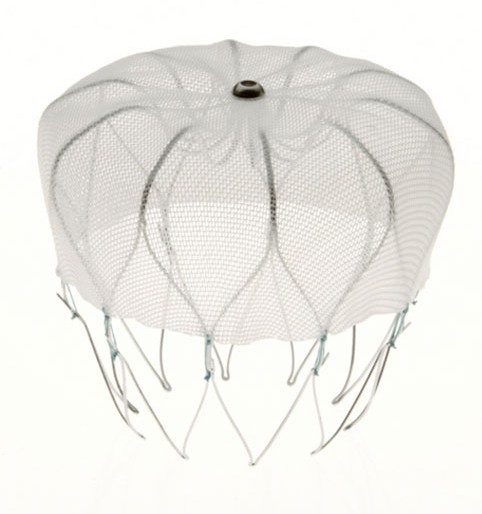


The Food and Drug plans to review data on left atrial appendage occlusion (LAAO) devices after a study found women implanted with Boston Scientific’s Watchman device experienced more adverse events than men. Credit: Boston Scientific
The Food and Drug Administration plans to take a closer look at implants to prevent stroke in patients with atrial fibrillation after a study revealed disparities in adverse events between men and women.
The study, published in JAMA Cardiology last month, found that women experienced more adverse events with Boston Scientific’s Watchman implant than men. Now, the agency plans to take a closer look at the study and other data related to Left Atrial Appendage Occlusion (LAAO) devices.
Boston Scientific’s Watchman device is designed to close the left atrial appendage, preventing blood from pooling there and forming clots in patients with atrial fibrillation. It got FDA approval in 2015, serving as an alternative to long-term use of blood thinners for stroke prevention.
Abbott recently got FDA approval for a competing device last month, its Amplatzer Amulet Device.
It’s not clear why women saw more adverse events than men in the study of Boston Scientific’s device. It included real-world data from more than 49,000 patients who had been implanted with the device between 2016 and 2019, including 20,388 women and 28,969 men.
Researchers found a significant difference between the two sexes, with roughly 6.3% of women experiencing adverse events compared to 3.9% of men. A larger portion of women also had hospital stays longer than one day.
However, the study was not randomized and did not include longer-term outcomes.
In an emailed statement, Boston Scientific stated that the study used its older Watchman device, which is no longer sold in the U.S., and that female patients in the study were older and had a higher risk profile than their male counterparts.
The company also pointed to a meta-analysis that found the efficacy of its Watchman device compared to anticoagulants was similar in women and men after five years.
“We are committed to ongoing research and continued innovation of this current device to promote optimal patient outcomes,” a spokesperson for Boston Scientific wrote in an email.
Abbott offered a similar statement:
“Understanding the potential differences in treatment effects between men and women is an important part of ensuring all patients receive effective therapy,” a company spokesperson wrote. “Importantly, Abbott has conducted two major clinical studies on our Amulet left atrial appendage closure device – our observational and IDE studies – and the resulting publications did not show differences in treatment effect or adverse events between men and women.”
The FDA said it will take a closer look at the JAMA study and other data, and work with device manufacturers to evaluate this potential issue. The regulator still says the benefits of these devices outweigh the risks when used as intended.
Currently, the FDA says physicians should continue to monitor patients as recommended, and have conversations with them about the risks and benefits of stroke prevention using these devices.
This potential disparity highlights the importance of representation in clinical trials. According to the authors of the JAMA Cardiology study, “women have been underrepresented in clinical trials of LAAO, and sex-specific subanalyses are limited.”
Other studies have raised similar concerns, such as finding women experienced worse outcomes than men after coronary artery bypass grafting, and were more likely to be undertreated for heart disease.


